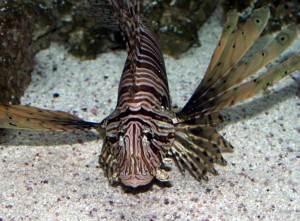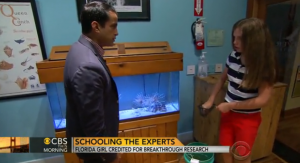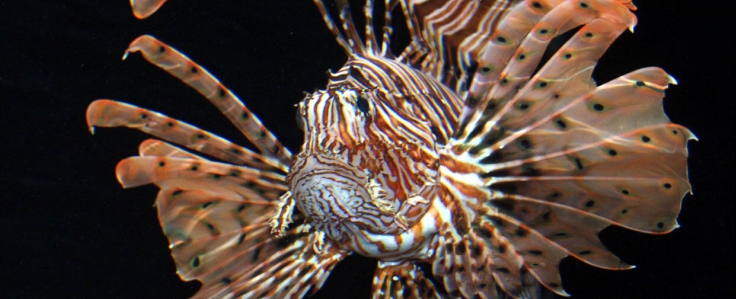The Case of the Lionfish and the 12-Year-Old Accused Plagiarist
 Earlier this month, Lauren Arrington became a global celebrity. In late 2012, she performed an experiment on lionfish, an aggressive species of poisonous fish that has been overtaking coral reefs in the United States, that showed the fish could survive in lower salinity water.
Earlier this month, Lauren Arrington became a global celebrity. In late 2012, she performed an experiment on lionfish, an aggressive species of poisonous fish that has been overtaking coral reefs in the United States, that showed the fish could survive in lower salinity water.
This finding led to something of a media frenzy this month, with several publications including NPR and CBS doing reports on Lauren’s work.
Those reports credited Lauren for discovering that lionfish could survive in fresh water, saying that it was a discovery that “shocked” ecologists and brought about drastic reform, including a ban on the import of lionfish into Florida.
However, the attention upset Zack Jud, who posted this to his Facebook Page:
According to Jud, he had made that discovery in 2010. He had even published a paper to that effect in 2011 (PDF). Lauren’s father, Albrey Arrington, is listed as a contributor on that paper.
The media turned on Lauren. She went from being the student was schooling ecologists, do being accused of stealing credit.
Unfortunately, the story isn’t that simple. Lauren and her father may have done some things wrong, but the situation is neither a cookie cutter case of a child prodigy nor is it a standard case of plagiarism.
Instead, it’s a case where questionable media coverage may have hurt the reputation not just of a young girl, but also her father and other researchers unfairly.
Poisonous Coverage of Poisonous Fish
 Christine Wilcox at Discover Magazine has put together a great timeline of the controversy and I will be basing much of what I say here on it.
Christine Wilcox at Discover Magazine has put together a great timeline of the controversy and I will be basing much of what I say here on it.
Beginning in August 201, Jud, who was being advised by Craig Layman, researches the lionfish intrusion and documents over 200 lionfish as far 5 km (3.1 miles) inland from the ocean. Local media actually covered the finding in September of that year and he published it in a peer-reviewed journal in 2011.
He continued his research in 2012, publishing a second paper and further inland. In August, he even found one nearly 6.5 KM (4.1 miles) inland and blogged about it. Albrey Arrington actually commented to that post.
In September of that year, Lauren began work on her science project and poster. Her goal was to more precisely test the salinity that lionfish could survive. Though Jud had measured the salinity of the water where the lionfish were spotted and knew they could survive in low-salt environments, a controlled experiment had not been done (though was planned). Lauren’s full poster credits Jud’s work.
In the summer of 2013, Jud and fellow research Patrick Nichols work to do their own controlled experiment testing the salinity that lionfish can survive. When they publish their paper in February 2014 (PDF), they acknowledge Lauren Arrington for having conducted a similar study.
In March of 2014, Jud defended his dissertation, which was also about the lionfish invasion but, in June, the Sun Sentinel covered Lauren’s research project, crediting her with a breakthrough.
On July 1st of this year, Jud wrote Albrey Arrington expressing concern that his name is being omitted and that his work is being misattributed in the media. Albert responded saying that he and his daughter mentioned Jud in the interview and that they provided PDFs of the research, which lists Jud as the primary author, to reporters.
However, the controversial reporting continued, most damningly with a CBS interview where the reporter asks, “So no one really knew that lionfish were a threat in rivers like this one?”
Albrey responded, “They didn’t. We certainly did not understand that. Lauren’s research showed they are.”
Lauren herself also said, “People knew that they could eat all the little fish in the ocean. But then, I was like, well what about the rivers?”
The CBS piece was followed by the NPR one, which was then followed by Jud’s Facebook post, which completely pivoted the story, against Jud’s wishes, turning Lauren Arrington from a child genius to a plagiarist.
But neither of those cases are the real story. A quick look at the history of events shows quickly that ethics weren’t an issue at all, until after the media got involved.
Enter the Media
Why the media took interest in a nearly 2-year-old science project isn’t clear, but when it did, things start to take a strange turn.
Lauren, by all accounts, did an excellent science project, especially for a girl her age. She conducted a controlled experiment based on ongoing research that she was aware of. She did a great job with her work, credited her sources and won third place in her category at the fair.
But when the media got ahold of the story, it went from being a tale of a student that contributed to the scientific process, already impressive enough, to a tale of a child genius who stood the ecology world on its ear. Prior to the media frenzy, Lauren never claimed that her science was revolutionary or anything other than a controlled experiment based upon field discoveries.
But while Lauren and her father both made questionable statements to the media, especially in the CBS interview, the frenzy was started well before that.
But while the exaggerations of Lauren’s work are definitely wrong, meaning she and her father have to share some of the blame, all of the actual work itself was attributed. All of the alleged exaggerations of originality and novelty were said to the media. However, it can be easy, when talking with the media, to feel pressured into saying things you don’t mean or to exaggerate, especially if you’re a child.
All of these exaggerations could have been trivially disproven. Since Lauren’s project was properly cited, a quick investigation into the (short) bibliography would have turned up Jud’s original paper. The connections could have been made much sooner and without the help of Jud but no one, not NPR, CBS or any other publication, did so.
If we’re going to blame Lauren and her father, we also have to examine the role of the media and why they were so eager to turn Lauren into a child prodigy.
The Media Loves Child Prodigies
As the BBC said, the media loves child prodigy stories. They feed into the culture of achievement we have provide a good underdog tale, a story of someone who is doing amazing things despite serious limitations, namely age.
But another story that people like are downfall stories, when someone on a pedestal gets what they deceiver and come crashing back down to earth. These are both common narratives we see in the media all the time as they both draw a lot of interest from the public.
So when there was conclusive proof that Lauren wasn’t the child prodigy the media built her up to be, there was a rush by many, in and out of the media, to assume that she was a plagiarist and to apply the latter narrative.
The truth is that, while Lauren and her father did say questionable things. The media did get wrong a very nuanced story about science, which is a common problem for the mainstream media.
Layman, Jud’s supervisor, may have unintentionally gotten this frenzy started with his quotes in the Sun Sentinel and elsewhere. However, he was so unhappy with how he was quoted that he refused further press interviews after those appeared.
The following stories had to be more explosive and more exciting to stay interesting, which put more pressure on the reporters, as well as Lauren and her father, to get more and more grandiose statements.
While none of this excuses making false statements about originality, it shows that Lauren isn’t a conniving plagiarist either.
In short, there are three scenarios that could explain where we are today:
- Lauren is a true child prodigy and Jud is somehow trying to steal credit from her.
- Lauren and her father conspired for at least two years to steal credit from Jud for his work.
- In the heat of a media frenzy, questionable statements and misquotes snowballed to give Lauren’s work more importance than it deserved.
The first is impossible given the preexisting research and the second is unlikely given that Laurent attributed Jud’s work in her project. That leaves only the third.
However, in that scenario, there’s more than enough blame to go around.
Bottom Line
To be clear, I don’t excuse Lauren or her father for their words, especially her father. While a 13-year-old might be easily pressured into saying questionable things on camera, even a bright and mature one, her father should have known and done better. Whether he misspoke or lied, his words were clearly false.
However, the media’s role in this was not minor. There were no attribution or other issues before the media attention fell on it. Whatever transpired between the reporters and the Arringtons is unclear, but out of that emerged a narrative of a child prodigy taking ecologists by storm.
Lauren is not some junior plagiarist that sought to steal credit from other researchers from the outset. She, at worst, said things in interviews that were directly contradicted by her own report.
While there are definitely tough questions for Lauren and her father, there are also tough ones for the media, which rushed to label Lauren a prodigy and then rushed to label her a plagiarist.
All without much proof that either was true.
Want to Reuse or Republish this Content?
If you want to feature this article in your site, classroom or elsewhere, just let us know! We usually grant permission within 24 hours.
